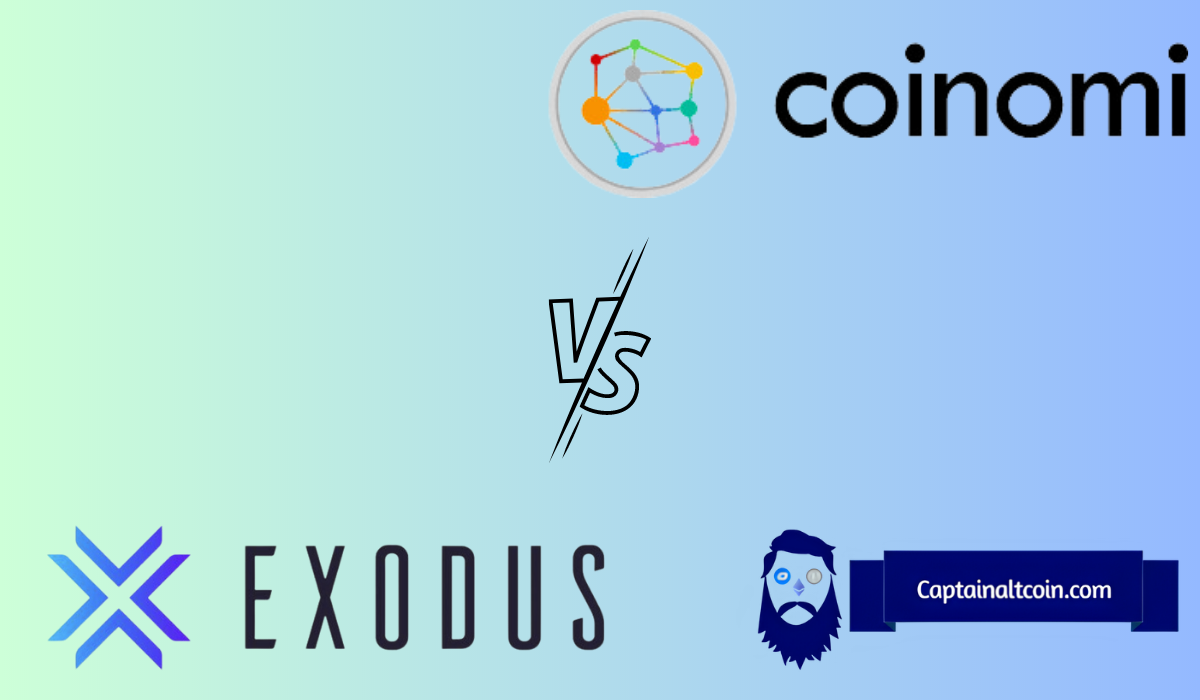
What you'll learn 👉
What is Coinomi?
Coinomi is a multi-chain, mobile cryptocurrency wallet that allows users to securely store and manage their digital assets. It boasts of a built-in exchange that enables users to exchange cryptocurrencies directly from the wallet.
Coinomi supports thousands of tokens and is available as a mobile app for both Android and iOS devices. With transaction history and low transaction fees, Coinomi has gained popularity among active users. Coinomi is also considered a non-custodial wallet, which means users have complete control over their funds and private keys.
In this article, we will compare Coinomi with Exodus, another popular cryptocurrency wallet, and determine which one is the better choice.
| Category | Coinomi | Exodus |
|---|---|---|
| 📱 User Interface | Clean, intuitive interface with easy navigation. | Sleek, modern, and highly customizable interface. |
| 🔒 Security Features | Advanced encryption, non-custodial, secure seed phrase storage. | Similar security system for desktop and mobile, supports importing private keys. |
| 💱 Supported Currencies | Supports 125 blockchains and thousands of tokens. | Supports over 100 cryptocurrencies. |
| 💰 Transaction Fees & Limits | No set limits, users control transaction fees. | No set limits, customizable transaction fees based on network activity. |
| 🔄 Exchange Partnerships | Partnerships with Binance, Bittrex, and Changelly. | Partnerships with Shapeshift, Bittrex, and Kraken. |
| 📲 Mobile Wallets Support | Mobile apps for Android and iOS, with real-time price tracking. | Mobile apps for Android and iOS, with comprehensive transaction history. |
What is Exodus?
Exodus is a popular non-custodial wallet that offers its users a comprehensive set of features and services. The wallet is designed to be user-friendly, making it easy for anyone to use. With support for over 200 cryptocurrencies, Exodus has become a go-to for many crypto enthusiasts.
Exodus also allows users to integrate with hardware wallets for improved security and peace of mind. Payment methods that are supported by Exodus include ApplePay, bank card, and wire transfers, providing users with a variety of options.
One of the most convenient features of Exodus is the integrated ShapeShift service, which enables users to easily swap tokens. Privacy is a key focus for Exodus, which is why it doesn’t require personal data from its users. This makes Exodus a great option for those who are concerned about their privacy.
In terms of security, Exodus has a number of features and hardware wallet integrations in place to protect users’ digital assets. One such feature is the 12-word seed phrase backup system, which provides an extra layer of security in the event of a lost or stolen device.
Exodus only charges miner fees, which are very low compared to other exchanges. This means that users can save money when they transact through Exodus. Overall, Exodus is a top choice for those looking for a reliable, easy-to-use, and feature-packed non-custodial wallet.
User Interface
When it comes to managing and interacting with digital assets, a user-friendly interface is crucial. In this section, we will compare and contrast the user interface of two popular non-custodial cryptocurrency wallets: Coinomi and Exodus.
Both wallets have garnered a large user base due to their multi-chain support, strong security features, and ease of use. Let’s take a closer look at their interfaces to see which one provides a better user experience.
Coinomi’s user interface
Coinomi is a popular non-custodial cryptocurrency wallet that is available on both mobile and desktop devices. The user interface of the Coinomi wallet is clean, intuitive, and easy to navigate. In this article, we will guide you through the different tabs and functions on the Coinomi wallet to help you make the most of your experience.
Home Screen:
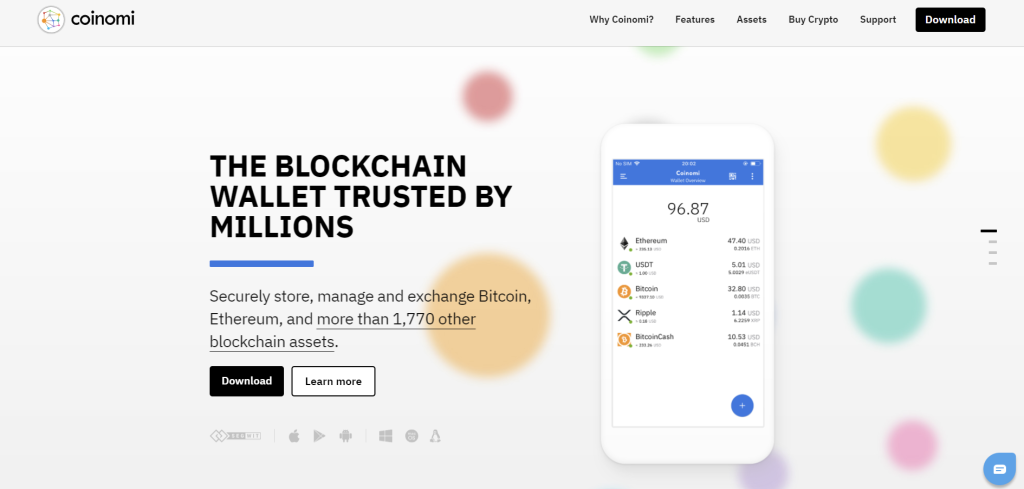
When you first launch the Coinomi app, you will be taken to the home screen. The home screen provides you with an overview of your cryptocurrency holdings, including a balance check of all your assets. You can also see the current market value of your holdings along with a percentage change in the last 24 hours.
Ellipsis:
By tapping on the ellipsis button located in the top right corner of the home screen, you can access a menu with several options. The first option is to add a new wallet, which allows you to select a new cryptocurrency and create a new wallet for that asset.
Main Menu:
Tapping on the “Main Menu” option in the ellipsis menu will take you to a screen that provides access to various settings and tools. Here you can access your transaction history, change your preferred currency representation (i.e., USD, EUR, etc.), and modify your account settings, like password and PIN.
Accounts:
The “Accounts” tab in the main menu displays all your wallets in one place. By tapping on any specific wallet, you can view your transaction history, copy your wallet address, or even export your private key. Additionally, you can initiate a transaction by tapping on the “Send” button, which allows you to send cryptocurrency to another wallet address.
Support Tab:
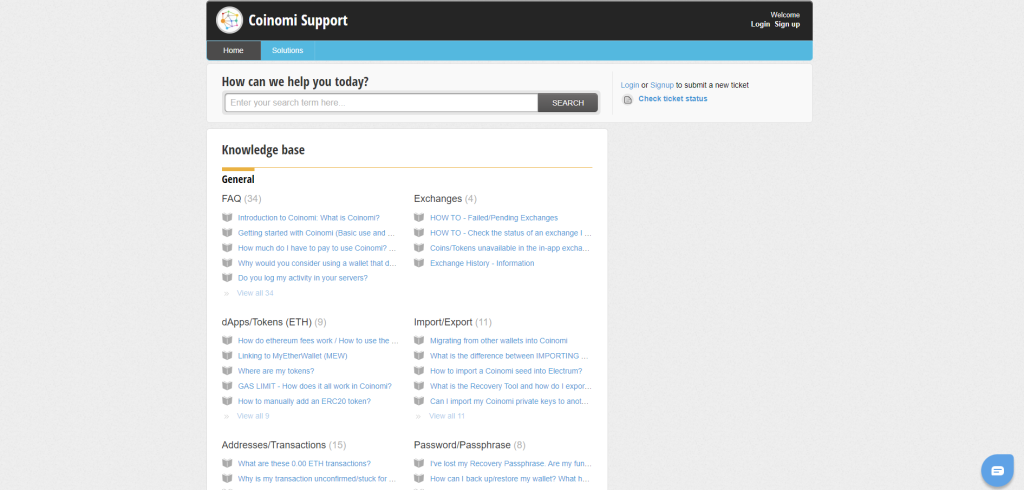
Lastly, the “Support” tab in the main menu is the go-to place for help. If you need assistance from Coinomi’s customer support team, this is where you can get access to their knowledge base and submit support tickets.
Importing a Paper Wallet:
Importing a paper wallet into the Coinomi wallet is simple. Tap on the “+” button on the home screen, and then choose “Import Wallet.” From there, you can scan a QR code or input a private key to import your paper wallet’s assets into your Coinomi wallet.
In conclusion, the Coinomi wallet provides an easy-to-use interface that is intuitive and beginner-friendly. With its clean layout and accessible settings and tools, it is an excellent choice for anyone looking to securely manage multiple crypto assets in one convenient app.
Exodus’ user interface
Exodus is a user-friendly cryptocurrency wallet that boasts a sleek and modern user interface. Its design is highly intuitive, making it an excellent choice for beginners new to the cryptocurrency world. The wallet’s user interface is easy to navigate, with clearly labeled buttons and menus that allow you to quickly access the features you need.
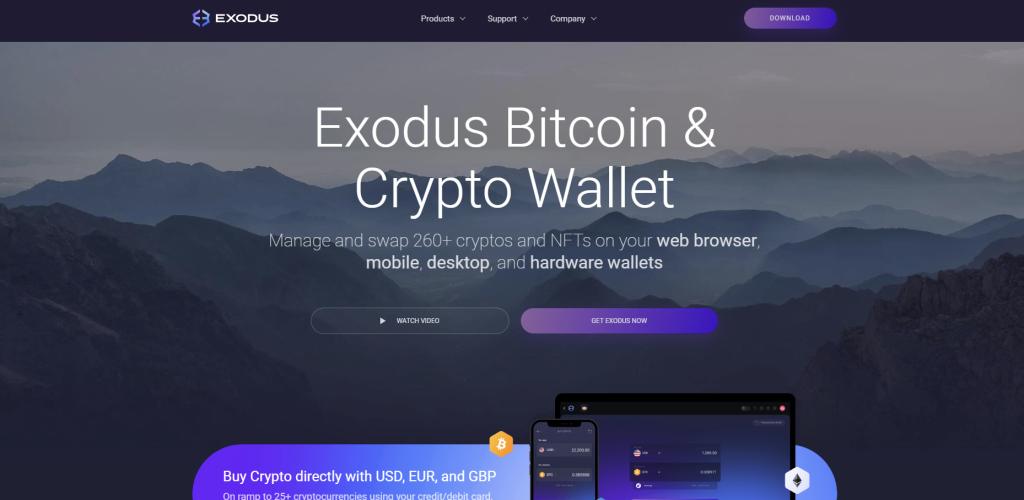
One of the standout features of Exodus is its built-in tools for transaction tracking and price alerts. The wallet tracks your transaction history, displaying all your past transactions in an easy-to-understand format. You can also set up price alerts to keep you informed of any price fluctuations that may affect your cryptocurrency holdings.
The user interface of Exodus is also highly customizable, allowing you to personalize it to your liking. You can choose from a variety of themes to change the appearance of the wallet, and you can also adjust the font size and color scheme to suit your preferences.
Exodus supports a range of payment methods, making it convenient for users from all over the world. You can use Apple Pay, bank cards, and wire transfers to purchase cryptocurrency directly from the wallet.
Furthermore, Exodus has partnered with Changelly, a popular cryptocurrency exchange, to provide seamless exchange functionality right within the wallet. This means that you can exchange one cryptocurrency for another without having to leave the wallet or navigate through multiple platforms.
Overall, Exodus’ user interface is both elegant and practical. Its intuitive design and powerful features make it an excellent choice for beginners and experienced cryptocurrency users alike. With its robust transaction tracking and price alert tools, as well as its variety of payment methods and exchange features, Exodus is a top contender in the world of cryptocurrency wallets.
Read our other wallet comparisons:
- Ledger Nano S Plus vs Nano X
- Ledger Nano S vs Nano S Plus
- Coolwallet PRO vs Ledger Nano
- D’cent Wallet vs Ledger Nano
Security
Security is a primary concern for any cryptocurrency holder. With the constantly evolving nature of the cryptocurrency space, it’s essential to choose a secure wallet that can protect your digital assets.
In this comparison, we’ll take a closer look at the security features of two popular mobile wallets we are covering in this article: Coinomi and Exodus. Both these wallets offer unique security features that make them ideal for protecting your coins and tokens against possible hacks and cyber threats. Let’s dive in and explore their different security measures.
Coinomi’s security features
Coinomi is a popular choice for those seeking secure wallets to store their digital assets. The wallet boasts robust security measures, which ensure that users’ funds are kept safe and secure. Below are some of the security features that set Coinomi apart from other crypto wallets in the market.
- 1. Encryption: Coinomi implements advanced encryption techniques to protect users’ private keys from unauthorized access. It uses AES-256 encryption, which is industry standard to provide an additional layer of security to the wallet.
- 2. Non-custodial wallet: Coinomi is a non-custodial wallet, meaning that users are in complete control of their assets. The wallet company has no access to their funds, which significantly reduces the risk of centralization. With Coinomi, users are the only ones responsible for controlling their private keys.
- 3. Seed Phrase Vulnerability: Coinomi also takes the utmost care in ensuring users’ seed phrases are securely stored. The seed phrase is the only method of restoring access to the wallet in case users forget their password. Therefore, it is critical to keep it safe. Coinomi wallet provides users with a seed phrase, which they must store in a secure location, preferably offline or written on durable material.
By using Coinomi, you can have peace of mind knowing that your digital assets are secure. The wallet offers a secure platform to store and exchange thousands of tokens across various blockchain networks with no transaction fees. Also, users can exchange cryptocurrencies right within the wallet via its built-in exchange partner, Binance Dex.
In conclusion, Coinomi wallet is an excellent option for those looking for a non-custodial crypto wallet that offers advanced security measures to keep their funds secure. With advanced encryption, private key control, and seed phrase vulnerability, Coinomi is a secure multi-coin wallet available on desktop and mobile.
Exodus’ security features
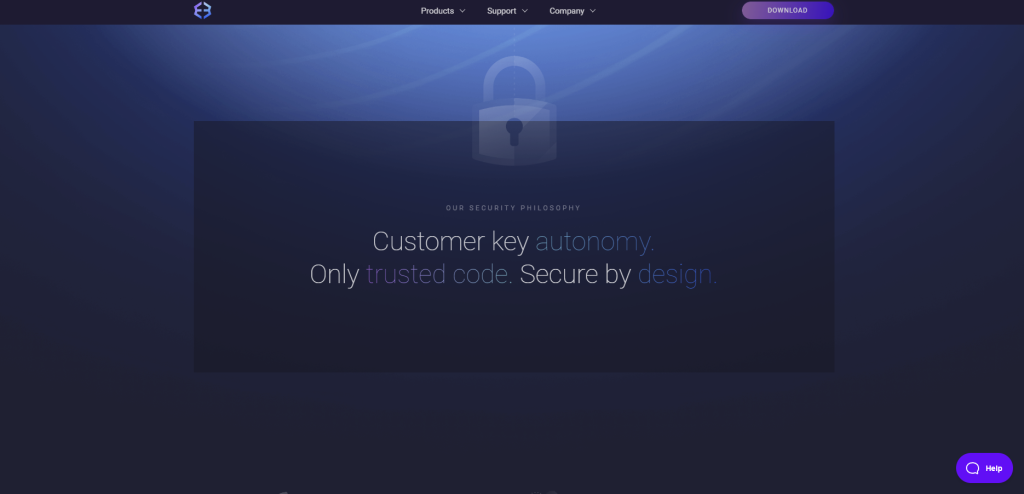
Exodus is another secure wallet option with several security features that protect users’ digital assets. Here are some of Exodus’ top security features:
- 1. Similar Security System: The desktop app uses a security system that is similar to the mobile wallet so that users can have the same level of security on both platforms.
- 2. Importing Private Keys: Exodus allows users to import their private keys, making it easier to manage their digital assets. There is a network transaction fee required to import the private keys, but it is a small price to pay for added convenience.
- 3. Supported Cryptocurrencies: Exodus supports importing private keys for different cryptocurrencies, including Bitcoin, Litecoin, Dogecoin, Dash, Ethereum, and several other crypto assets. It supports both compressed and uncompressed private keys, so users do not have to worry about compatibility issues.
- 4. Encrypted Private Keys: Exodus also supports importing encrypted private keys for Bitcoin and Bitcoin Cash, making it easier for users to secure their assets from unauthorized access.
- 5. XRP and Stellar Lumens Import: In addition, secret keys for XRP and Stellar Lumens can be imported in the same way as private keys, providing users with complete control over their digital assets.
Overall, Exodus is a great choice for those who want to manage their digital assets securely. With features like importing private keys and support for different cryptocurrencies, users can enjoy complete control over their digital assets.
Supported Currencies
Coinomi and Exodus are both popular choices when it comes to managing digital assets. One of the most important features to consider when choosing a crypto wallet is the number of supported currencies. In this section, we will compare Coinomi and Exodus based on their supported currencies and how they handle different crypto assets.
Coins supported by Coinomi
Coinomi is a popular non-custodial cryptocurrency wallet that supports a wide variety of digital assets. In fact, the wallet is compatible with 125 blockchains and allows users to store and manage thousands of tokens.
When it comes to cryptocurrencies, Coinomi supports some of the most well-known options in the market. Bitcoin (BTC), Ethereum (ETH), Ripple (XRP), Tether (USDT), and Litecoin (LTC) are among the most popular coins supported by Coinomi.
However, the wallet also supports other lesser-known coins, giving its users a comprehensive offering of crypto assets to choose from. With Coinomi, users can have complete control over their digital coins on both desktop and mobile devices, with support for cross-platform use.
Additionally, Coinomi offers built-in exchange capabilities, allowing users to exchange cryptocurrencies directly within the wallet. With real-time status tracking, low transaction fees, and strong password protection, Coinomi has become a popular choice among cryptocurrency enthusiasts seeking peace of mind when it comes to their digital assets.
Overall, Coinomi is a multi-chain and multi-coin wallet that provides support for numerous cryptocurrencies. With the wallet’s compatibility with 125 blockchains, users have access to a diverse set of coins, including Bitcoin, Ethereum, Ripple, and other popular cryptocurrencies.
Coins supported by Exodus
Exodus wallet supports a diverse range of over 100 cryptocurrencies, making it a popular choice among crypto enthusiasts. To see the full list of supported cryptocurrencies on Exodus, simply navigate to the ‘Portfolio’ tab and click on ‘Add Asset’. From there, you can scroll down the list or use the search bar to find specific coins.

Some of the most popular and widely used cryptocurrencies supported by Exodus include Bitcoin (BTC), Ethereum (ETH), Ripple (XRP), Litecoin (LTC), and Bitcoin Cash (BCH). However, Exodus also supports other lesser-known coins, giving its users a comprehensive offering of crypto assets to choose from and manage.
Whether you are a crypto investor or just looking to store your digital assets securely, Exodus wallet provides a user-friendly interface and strong security measures to keep your crypto assets safe. With the ability to manage multiple cryptocurrencies in one place, Exodus has become a popular choice for those seeking a reliable, secure and versatile cryptocurrency wallet.
Transaction Fees & Limits
Transaction fees and limits are important aspects to consider when choosing a cryptocurrency wallet. In this section, we take a closer look at how Coinomi and Exodus compare in terms of their transaction fees and limits. We’ll examine the standard fees charged by each wallet and the limits imposed on transactions, allowing readers to make an informed decision when selecting their preferred crypto wallet.
Transaction fees and limits for Coinomi users
Coinomi is a popular choice for mobile cryptocurrency wallets, known for providing a plethora of digital assets and built-in exchange services supporting thousands of tokens. When it comes to transaction fees and limits, one of the significant advantages of Coinomi is that it offers a non-custodial wallet without charging fees for installation or usage.
Coinomi allows users to select how much they want to pay for their transaction fees, offering options like Low, High, and Dynamic. Network costs are the only charges associated with digital currency transactions using Coinomi. For example, if a user wants to make a Bitcoin transaction, the network cost will be approximately 0.0003 BTC, and for Ethereum transactions, it would be around 0.001 ETH.
Coinomi wallet fees are not charged, which means that users have more control over their transaction fees, making Coinomi a cost-effective choice for cryptocurrency enthusiasts. In terms of transaction limits, there are no set limits on the amount of cryptocurrency that a user can send or receive using Coinomi. Transaction limits are determined by the respective blockchain networks that support the cryptocurrencies.
Coinomi supports several coins, including Bitcoin, Ethereum, Binance Coin, Tether, Litecoin, Ripple, and many others. For instance, for Ethereum and its tokens, Coinomi charges approximately 0.0006 ETH for a standard transaction. In contrast, for Bitcoin and several other cryptocurrencies, the network charges may vary and depend on the transaction’s size and urgency.
To view the fees and limits in the app, users can check their transaction history. It will show the network transaction fee and the amount that was sent in the cryptocurrency of their choosing.
In conclusion, Coinomi offers users a variety of coins and low fees for transactions with no set limits. With its user-friendly interface and seamless cross-platform connectivity, Coinomi is an excellent choice for those looking for a secure and efficient way to manage their digital assets.
Transaction fees and limits for Exodus users
Exodus users have the option to customize their transaction fees based on network activity and demand. When making transactions on the Exodus wallet, users are charged network fees associated with the blockchain network that supports the cryptocurrency they are transacting. These fees can vary greatly depending on the network’s activity and demand.
It’s worth noting that Exodus itself does not profit from transaction fees. Instead, the fees are used to pay the blockchain’s network validators, also known as nodes. In most cases, the fees are minimal and are required to process transactions quickly.
In terms of transaction limits, Exodus does not impose any set limits on the amount of cryptocurrency that can be sent or received. However, some blockchain networks may have their own limits or restrictions, and users should be aware of these when conducting transactions.
Overall, Exodus offers a user-friendly interface to help users customize their transaction fees and monitor their transaction history. By providing more control over transaction fees and avoiding any profit on said fees, Exodus ensures a transparent and cost-effective experience for its users when sending and receiving cryptocurrency.
Exchange Partnerships & Mobile Wallets Support
Coinomi and Exodus are both multi-coin and non-custodial cryptocurrency wallets that offer support for multiple blockchain networks and thousands of tokens.
When it comes to exchange partnerships, both Coinomi and Exodus have teamed up with various cryptocurrency exchanges to provide users with a seamless trading experience. Coinomi has partnered with exchanges such as Binance, Bittrex, and Changelly, while Exodus has partnered with leading exchanges like Shapeshift, Bittrex, and Kraken.
In addition, both wallets also support decentralized exchanges (DEXs) like Uniswap, KyberSwap, and Bancor, offering users complete control over their cryptocurrency assets and the ability to exchange cryptocurrencies without the need for a centralized intermediary.
Regarding mobile wallets support, Coinomi and Exodus offer mobile apps for Android and iOS devices. The Coinomi mobile app provides real-time price tracking for multiple cryptocurrency assets, as well as the ability to use fiat currency representations for some cryptocurrencies. The app also offers users the option to buy cryptocurrency directly from the wallet using a bank card.
On the other hand, Exodus mobile app provides a comprehensive transaction history and status tracking for users, allowing them to keep track of their cryptocurrency transactions in real-time. Additionally, the app offers support for debit card payments and cryptocurrencies such as USD Coin.
In summary, both Coinomi and Exodus offer strong exchange partnerships and extensive mobile wallet support, making them a popular choice among active users in the growing world of cryptocurrency.






